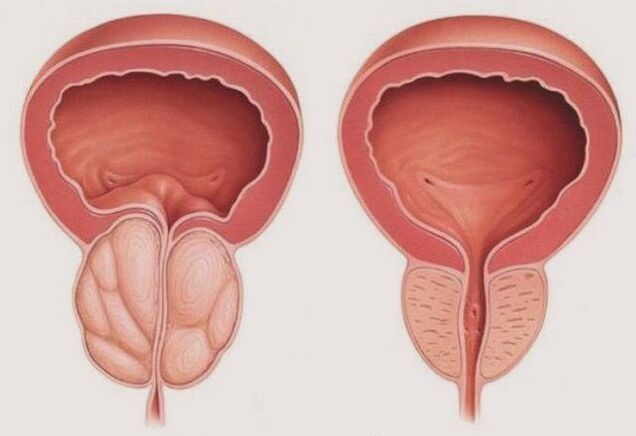Prostatitis is an inflammation of the prostate gland. Currently, urologists are inclined to think that prostatitis is not a single disease but a combination of many diseases in the male genitals. This is one of the common pathologies in the male urogenital tract and according to experts, the percentage of men with prostatitis in one form or another is constantly increasing. With age, the risk of developing prostatitis increases.
Causes of prostatitis
The immediate cause of prostatitis are two factors of equal importance. The first is the appearance of obstruction in the small pelvis, and as a result in the prostate gland, and the second is further infection. However, in some cases, the infectious agent cannot be detected in the tissues of the prostate gland, perhaps in such cases an autoimmune process becomes the cause of prostatitis, which can cause prostatitis. That is, the prostate gland is attacked by its own immune cells. system, due to a problem in it.
Factors that predispose to the onset of inflammation in the prostate gland are: weakened immune system due to infection, hypothermia, stress; Hormonal disorders, incomplete ejaculation, inactivity, love to eat (addiction to fried, fatty, smoked, spicy foods), frequent urinary retention. An irregular sex life is considered one of the common causes of prostatitis.
Types of prostatitis
Currently, the international classification of prostatitis has been adopted, which classifies the most complete and includes all types of inflammation:
- Type I. Acute prostatitis;
- Category II. Chronic bacterial prostatitis;
- Type III. Chronic nonbacterial prostatitis / Chronic pelvic pain syndrome - an undetectable infection lasting more than 3 months;
- Subtype III A. Chronic inflammatory pelvic pain syndrome (leukocytes identified in the biliary tract);
- Class III B. Chronic non-inflammatory pelvic pain syndrome (absence of white blood cells in the prostate);
- Category IV. Asymptomatic chronic prostatitis (leukocytes present in the bile ducts of the prostate gland, the patient does not present with complaints, the disease is discovered incidentally).
- pain in the pelvis and genitals;
- urinary disturbances, including slow flow, intermittent flow, incomplete bladder emptying, frequent urination, etc. v. ;
- disorders in the genital area.
- analysis of the secretion of the prostate gland;
- digital rectal exam;
- transrectal ultrasound of the prostate gland;
- Ultrasound of the kidneys and bladder;
- blood test for PSA (prostate antigen);
- general blood analysis;
- general urinalysis;
- urinalysis for urogenital infection before and after prostate massage;
- uroflowmetry (urine test).
Symptoms of Prostatitis

There is the so-called "prostatitis triad, " the three most common symptoms of prostatitis. Including:
It should be noted that not all three symptoms of prostatitis are mandatory, in addition, acute and chronic prostatitis progress in different ways.
Symptoms of acute prostatitis: severe pain, sharp pain in the prostate, rectum, perineum, testicles, lower back; general worsening, fever, headache and muscle pain, general weakness; violation of urination to acute urinary retention as a result of prostate edema and urethral compression.
Symptoms of chronic prostatitis: pain in the area of the prostate gland, but less intense than in acute prostatitis; urinary disorders, sexual disorders: incomplete erection, short-term erection, rapid ejaculation, etc. v. Chronic prostatitis can have an undulating course, when periods of exacerbation are replaced by periods of remission, or it can have persistent mild symptoms.
Unlike other inflammatory diseases, when chronic inflammation is the result of untreated acute inflammation, chronic prostatitis is often primary chronic, the patient itself is difficult to determine the stage. onset of the disease.
Diagnosis of prostatitis
To diagnose prostatitis, the following studies are performed:
The main thing in the diagnosis is to determine the cause of prostatitis, since treatment measures depend on this. Another diagnostic challenge is to rule out prostate cancer.
Prostatitis treatment
Acute and chronic prostatitis of bacterial origin is treated with antibacterial drugs. Strong antibiotics are prescribed for acute prostatitis, even before bacterial culture results are available, because the acute process requires immediate measures. In the complex, non-steroidal anti-inflammatory drugs are prescribed, which also have an analgesic effect.
Chronic prostatitis is treated depending on the underlying cause. For non-bacterial prostatitis, general strengthening, immunomodulatory drugs are performed. Treatment of prostatitis is carried out with mandatory participation of physiotherapeutic procedures: laser therapy, magnetic therapy, drug electrophoresis, ultrasound, etc. v.
Urologists say that treating prostatitis with only medical measures will only provide temporary relief, because if you don't change your usual lifestyle, the treatment of prostatitis willinefficient. It is necessary to give up bad habits, lead an active lifestyle, eliminate asthenia, avoid stagnation in the small pelvis with the help of special gymnastics, try to spend less time in the car, walkmore and should also get enough rest.
It's also important to improve your sex life, regularly and eat well. Chronic prostatitis is easy to recur, so regular lifestyle changes are needed, only in this case to completely treat prostatitis.
Treatment of prostatitis with folk remedies
For the treatment of prostatitis, folk methods are widely and successfully applied, especially in the treatment of chronic prostatitis. They have a gentler effect than drugs but are still quite effective and have fewer side effects, so the treatment of prostatitis with folk remedies can be done for a long time until the symptoms disappear. Symptoms of the disease are eliminated.
From folk remedies to treat prostatitis, teas made from medicinal herbs with anti-inflammatory and antibacterial effects are widely used: tea made from chrysanthemum flowers, sage leaves, chrysanthemum flowers. . . Medicinal herbs are also used in the form of decoction and medicine. Honey and bee products are used as tonics. Beeswax is the perfect product to apply in the treatment of chronic prostatitis, replacing paraffin wax. Echinacea tincture is used as a mild immunostimulant; For the same purpose, several types of honey have been used successfully.































